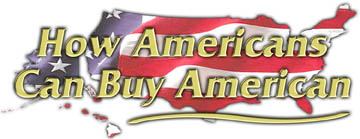 Supporting American-Made Products and Services from American-Owned Companies |
Free Trade: A Defeatist Mindset
Our Buy American Mention of the Week! by Roger Simmermaker July 29, 2017 In the minds of free traders, America simply cannot win on trade. Free and open trade undoubtedly causes injury to American workers and industries, since we give foreign producers lower-cost access to American consumers. So we lose and foreign producers win. But according to free trade defeatists, we can't protect American producers and manufacturers from cheap imports, supposedly because that invites retaliation - a scenario in which supposedly nobody wins. Translated: If nobody wins, we still lose. So free traders believe there is no way we can win on trade. No way to stop getting our goods from workers in foreign countries who pay no taxes to America. No way to reduce the flood of imports. No way to restrict trade - even though Congress is given the power in our Constitution to "regulate trade with foreign nations." We can't use import tariffs, apparently, even though it is authorized in our Constitution and has been used repeatedly throughout our history to both raise revenue and protect and bolster U.S. manufacturing. The times have changed, we are told. We are in a global economy. Things are different now, so we need to do things differently. If that's true and we need to change things simply because the economy has changed, then let's throw out the Constitution. Let's elect a King instead of a President. If George Washington was wrong to sign the Tariff Act of 1789, maybe he was wrong that we shouldn't have a King. All bets are off, apparently. In the minds of free trade defeatists, there's no way we can erase trade deficits and return to trade surpluses (some would even argue we shouldn't), even though history clearly shows that we had persistent trade surpluses under protectionist policies. Protectionism in China results in trade surpluses for them. Protectionism in Germany results in trade surpluses for them. But protectionism in American can't work for America, according to free trade defeatists, despite American history and despite modern day evidence it works in foreign countries to their advantage. Free traders believe that the reverse is true. In the minds of free traders, imposing tariffs on imports certainly results in retaliation, even though the U.S. almost never retaliates when foreign nations apply protectionist tariffs on U.S. exports. The sky is blue in other countries, and it's historically been blue here, but today it can't be blue. It has to be something else. Free traders even believe that the Great Depression was caused by the Constitutionally-enacted Smoot-Hawley Tariff Act that became law after the Great Depression actually started. Republican Senator John Heinz III, who tragically died in 1991 when his plane crashed, had a respected, national reputation for his expert knowledge in international commerce. While serving in Congress, Senator Heinz III chaired the Subcommittee on International Finance and Monetary Policies, and had this to say about the myth of the Smoot-Hawley Tariff in 1985:
So we continue with more free trade, hoping that since we have opened our market to foreign producers, they will eventually open their markets to us. Guarantees for prosperity for foreign producers now, and a mere hope for illusory gains for us in the future - if foreign nations don't change their minds on their intentions. George Washington warned us against foreign entanglements, saying in his Farewell Address that There can be no greater error than to expect or calculate upon real favours from nations. The ability for a nation to produce and export is often associated with their ability to "make a living." As President Eisenhower once said, Japan cannot live, and Japan cannot remain in the free world unless something is done to allow her to make a living. But if we enact tariffs to protect American jobs from foreign competition so that Americans can "make a living," the policy that worked for Japan suddenly doesn't make sense for America. We are constantly engaged in a game of "Do you like us yet?" with foreign nations. As President William McKinley once said Why should he [the foreign producer] enjoy unrestrained equal privileges and profits in our markets with our producers, our labor, and our taxpayers? While still Governor, William McKinley also said, This country will not and can not prosper under any system that does not recognize the difference of conditions in Europe and America. Open competition between high-paid American labor and poorly-paid European labor will either drive out of existence American industry or lower American wages, either of which is unwise. We clearly have to do something different than we have been doing the past four decades. According to James A. Stuber, J.D., author of What if Things Were Made in America Again: How Consumers Can Rebuild the Middle Class by Buying Things Made in American Communities, cumulative trade deficits (in goods) between 1985 and 2015 have totaled a whopping $16 trillion. 1947
|
